Original link: https://shyrz.me/news-22-gender-war/

22 10 15 Issue 22

Everyone, long time no see! The weather is suddenly cold, pay attention to keep warm.
The most noteworthy news in the near future is the announcement of the 2022 Nobel Prizes. We have briefly summarized these contents in chronological order; the selected article “Why feminists do not promote hard physical work?” pointed out that in In the gender equality movement in the United States, there is an unreasonable phenomenon and another possible solution for both men and women. I believe it also has a strong reference to the current feminist status of the Chinese Internet. Hope that inspires.
2022 Nobel Prize announced
→ Link: https://www.nobelprize.org/all-nobel-prizes-2022/

© Nobel Prize Outreach. Photo: A. Mahmoud
Physiology or Medicine Award
Awarded to Svante Pääbo (Swante Pääbo/Sweden) on 3 October 2022 for his contributions to the study of the genome of extinct ancient humans and human evolution.

Physics Prize
4 October 2022 Awarded to Alain Aspect (Alain Aspe/France), John F. Clauser (John Clauser/USA) and Anton Zeilinger (Anton Zeilinger/Austria) “Entangled photon” experiments, verifying violations of Bell’s inequality, and pioneering quantum information science”.

Chemistry Prize
October 5, 2022 Awarded to Carolyn R. Bertozzi (Carolyn Bertozzi/USA), Morten Meldal (Morten Meldal/Denmark), K. Barry Sharpless (Karl Barry Sharpless/ United States) for their contributions to the development of click chemistry and bioorthogonal chemistry.

Literary Award
6 October 2022 Awarded to Annie Ernaux (Annie Ernaux/France) for “courage and acumen” in literary creation.

Peace Prize
October 7, 2022 Awarded to Ales Bialiatski (Ales Bialiatski/Belarus), Memorial (Russian human rights organization Memorial), Center for Civil Liberties (Ukrainian human rights organization Civil Liberties Center) for record Outstanding efforts have been made on war crimes, human rights violations and abuse of power.
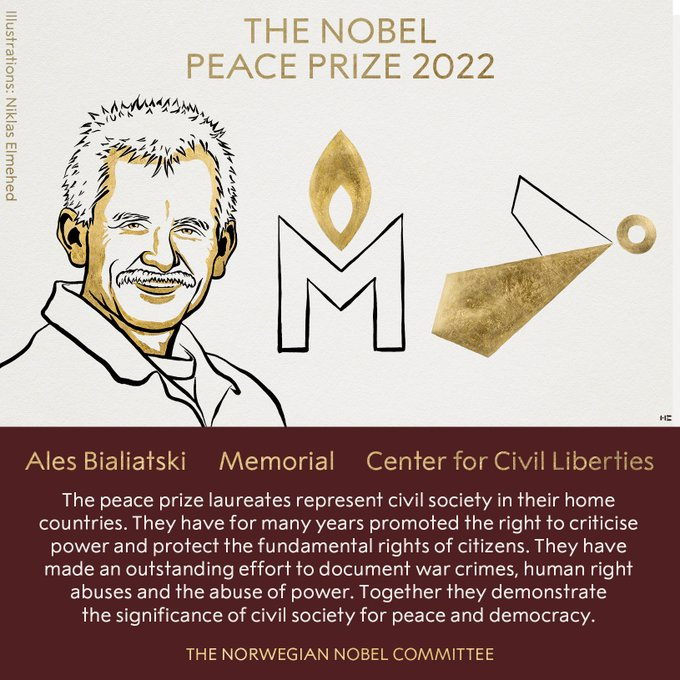
Economics Prize
Awarded on October 10, 2022 to Ben S. Bernanke (Ben Bernanke/USA), Douglas W. Diamond (Douglas Diamond/USA) and Philip H. Dybvig (Philip Dybvig/USA) in recognition of For their outstanding contributions in the field of banking and financial crisis research.

“Why don’t feminists promote hard physical work?”
→ Original link: “Why Aren’t Feminists Pushing for Hard Physical Jobs?” Erik Engheim / Medium / August 25, 2022
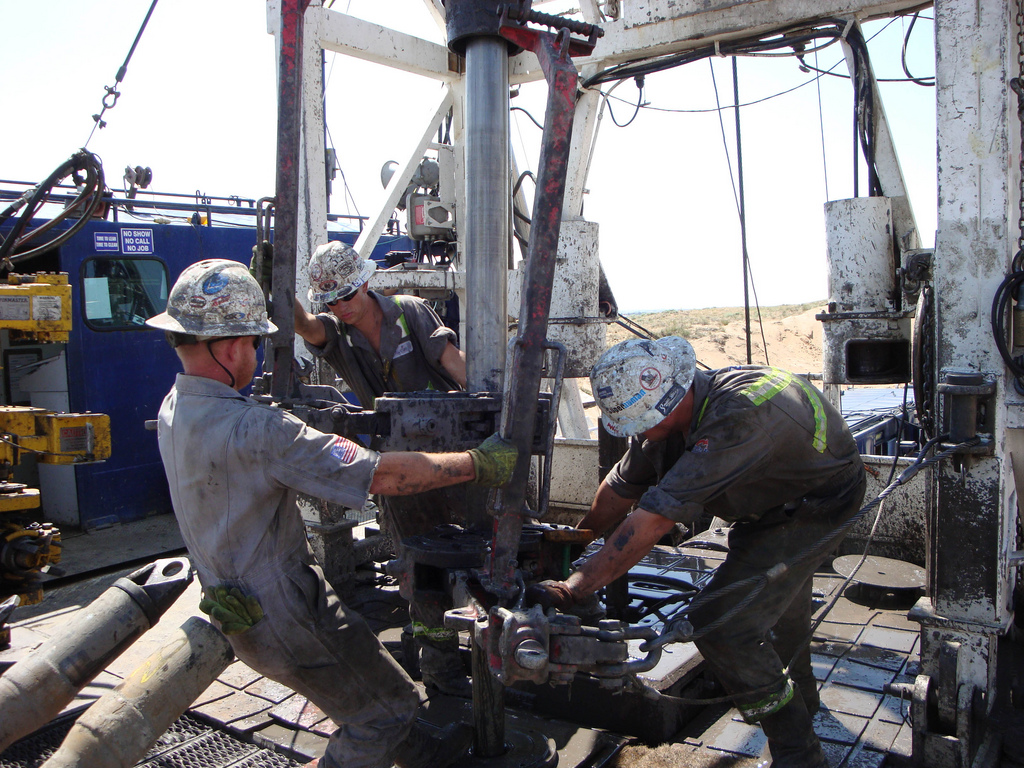 oil well worker on drilling rig
oil well worker on drilling rig
It all started with a video clip of two muddy American oil well workers making a pipeline connection. It was posted by a Twitter account with as many as 470,000 followers to mock calls for gender equality. The implication is that women don’t really want gender equality, they just want easy, high-paying jobs and leave rough, physically demanding and dangerous jobs to men.
→ Video: https://twitter.com/ElijahSchaffer/status/1561796821369978882
Another suggestion is that women simply aren’t strong enough for these jobs, or they’re too pampered to do the dirty work.
So, what do I think of the whole debate? My initial reaction was actually more about how reckless and dangerous the behavior in the video was. These men operate heavy equipment made of solid steel with minimal personal protective equipment, some of which runs very fast.
I’ve never actually been on an oil rig before, but I’ve worked in the oil and service industries in Norway, so I know about the industry from people in the office, many of whom have worked on rigs or Participated in drilling operations. I’m developing software used by geologists and drillers, so we have to know how this hardware works in practice.
It’s clear to me that the way these American oil well workers work is absolutely not tolerated in modern Norway (and probably in most cases the US as well). The safety and welfare of workers has a very high priority. So, I checked out some videos and pictures of how drilling works in Norway. I came across an interview with Norwegian Emmy Blix as an apprentice at the Statfjord C oil platform in the North Sea. I’ve posted her photo below, pointing out a few important things:
- She is wearing appropriate protective gear such as a hard hat, safety glasses, gloves and ear muffs
- The job is more about operating advanced machinery than pushing heavy equipment
- Drilling operations can be automated, which also happens to be more suitable for both genders
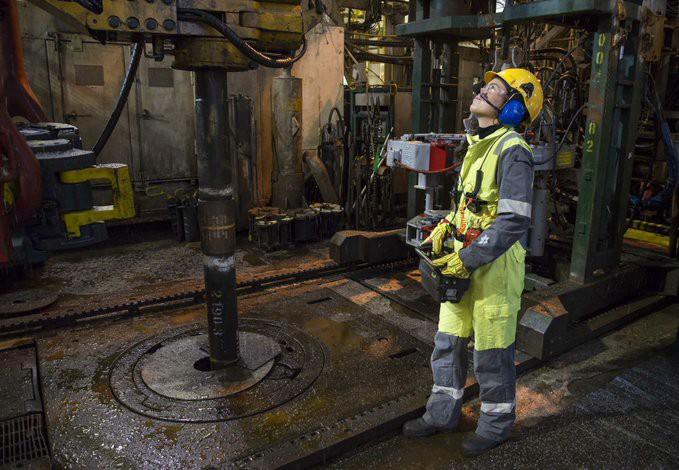 Norwegian Emmy Blix on a remote-controlled lifting device
Norwegian Emmy Blix on a remote-controlled lifting device
My comment got thousands of likes and hundreds of retweets, followed by enthusiastic replies and comments. I read and responded, realizing that I fell down the rabbit hole of America’s gender wars.
The Rabbit Hole of America’s Gender Wars
What I’ve noticed is that everyone is eager to bring the other down, as if the men and women of America were part of some kind of big long game with a scoreboard. They’re all collecting points until a winner is announced in the distant future: which gender is more useful, which is more oppressed, or whatever gender they’re trying to identify.
I’ve noticed that many men have several recurring inferences:
- The fact that work is more automated means it’s not the same work being done
- Most of these rough jobs are still done by men
- Not all companies have more automation equipment and not all countries can afford it
The first objection seems to stem from the idea that I deprive men of credit because they do a rough job that is difficult, if not impossible, for women to do. First, let’s be clear that there are, in fact, many women doing exactly the kind of work shown in the video. Yassmin Abdel-Magied in the picture is one of them.
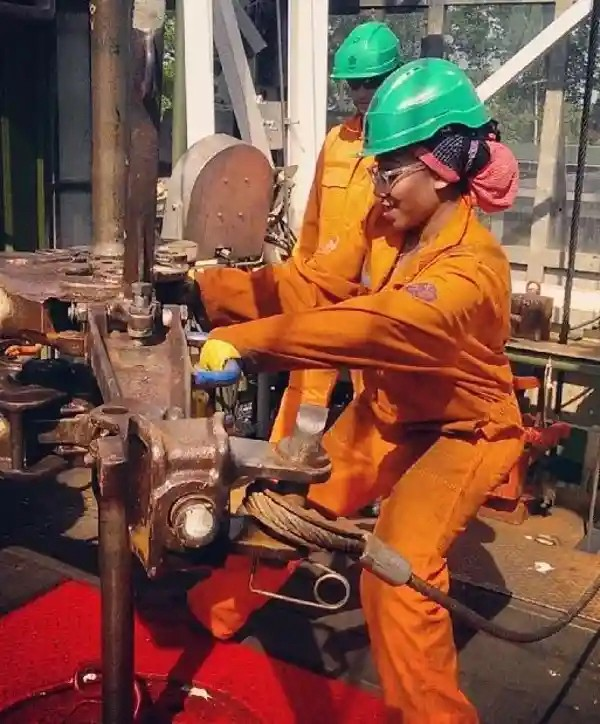 Yassmin Abdel-Magied: Life on an oil rig
Yassmin Abdel-Magied: Life on an oil rig
Yassmin appeared in a Guardian article: “Stories you wouldn’t believe: I worked on an oil rig with 150 men” .
What I’m trying to say is that you can do the job of an oil well worker in a more automated way, mainly to show that the job of making tubular connections for drilling wells can be changed to make it easier for more people to use. This has nothing to do with belittling people who do manual labor today, but just to point out that there are ways to make work life more inclusive.
My point is that I think many women want more options in their careers, but they may need some adjustment. The gender debate was conducted in a very American way. As many of us living in northern Europe have become accustomed to, the debate in the US tends to become very polarized. For us Nordics, inclusion of women in such blue-collar jobs is actually quite normal. It’s a good thing that women like Emmy Blix do get coverage in the media.
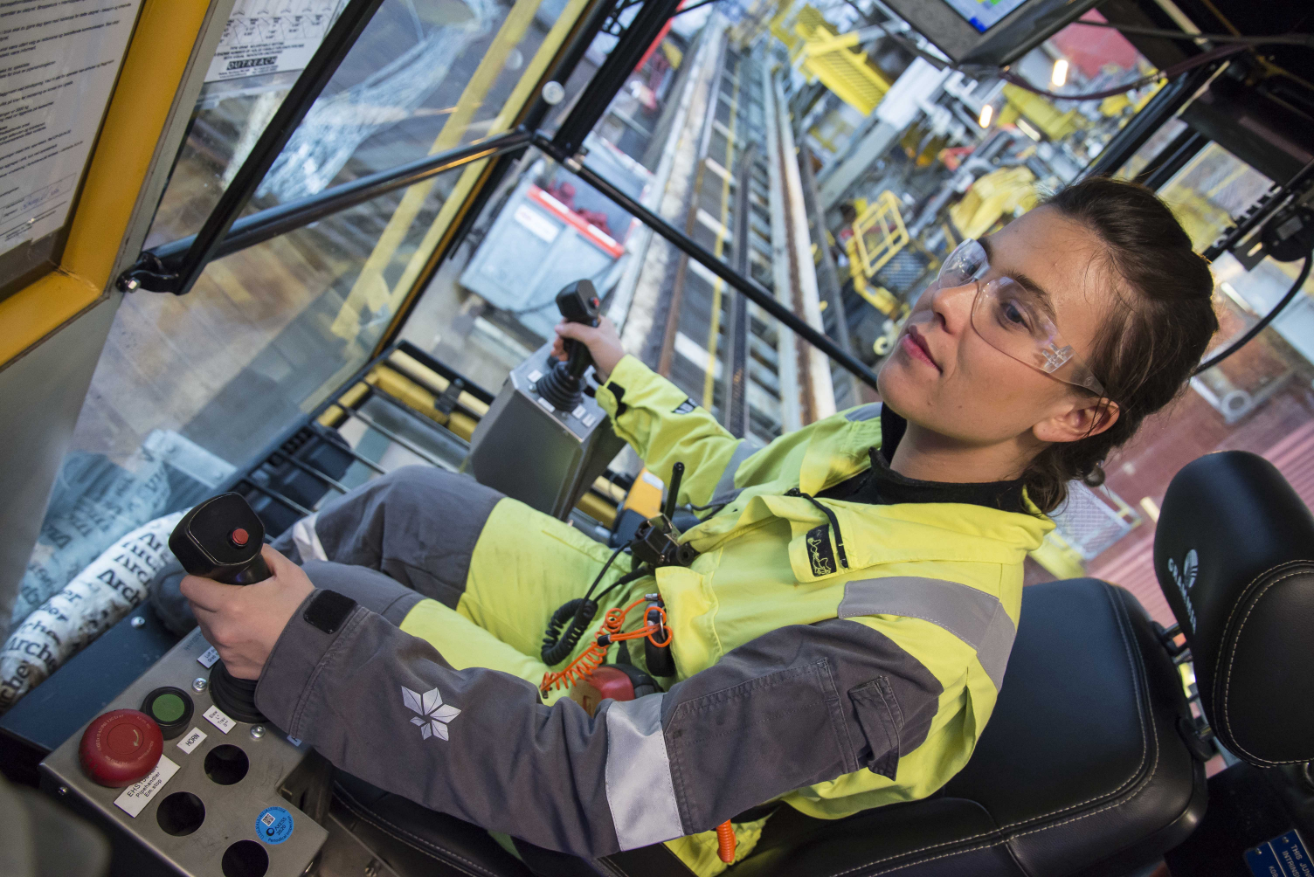 Norwegian Emmy Blix operates a crane to move the drill string on Statfjord C
Norwegian Emmy Blix operates a crane to move the drill string on Statfjord C
Like many other Nordic and Germanic countries, Norway has vocational training programmes integrated with high schools. Below is website information on training for working on oil platforms. You can see them actively trying to promote women as women working in the field.
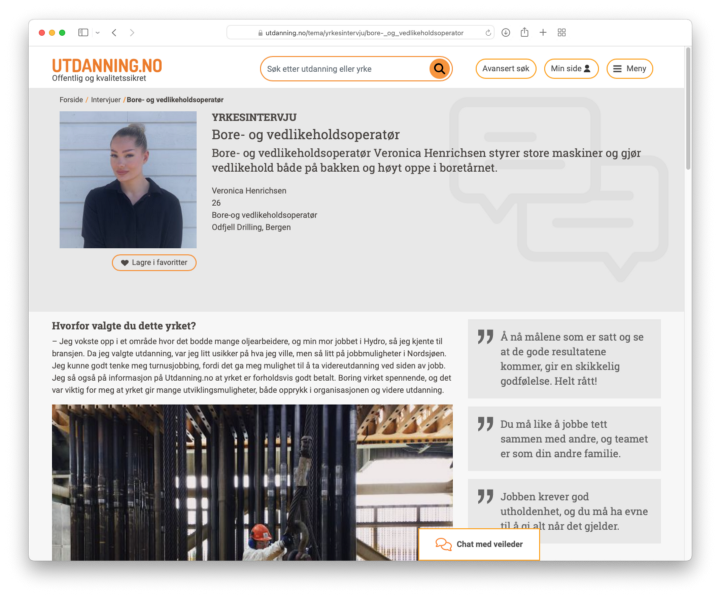
Oil Well Worker Training in the U.S. and Norway
Norwegian high schools are not like the US where they are universal for everyone. You can choose a specific type of high school based on the career you want to pursue. In Norway, you can choose from 15 different educational programmes, 10 of which are vocational training. There are different majors to choose from in the second year, which means there are plenty of options.
Many of these choices represent typical male occupations, such as oil well workers, but the promotional material you see and what schools try to promote is always keen to encourage women to choose these occupations. I’ve never had the impression that the fight for gender equality in Norway is about giving all the good, easy jobs to women and leaving men to do the bad, dangerous ones. Actually requiring women to serve in the military was driven by many feminists. In fact, many of us are not concerned with gender equality and are skeptical about requiring women to serve in the military.
 Thomas Poer and Kristin Hansen – Norway is the only NATO country where military service is mandatory for both men and women. Somewhat unusually, Norway’s dormitories and troops are co-ed
Thomas Poer and Kristin Hansen – Norway is the only NATO country where military service is mandatory for both men and women. Somewhat unusually, Norway’s dormitories and troops are co-ed
If some jobs are considered dangerous, then instead of saying “leave it to men,” we’re calling for a change in the way those occupations work to make it safe for everyone. Just because you’re a man shouldn’t put your health at risk.
This is where I don’t understand the American debate. Some men seem to think that instead of calling for a safer work environment for men, it’s better to declare that women can’t do the job. Who is scoring? There is little bonus for taking a dangerous job that could cripple or kill you.
Most manual labor is still done by men, but that doesn’t mean we can’t improve these jobs to make them more valuable for both sexes. I also don’t think it’s entirely fair to characterize this disparity as men being treated unfairly. Men face more danger in many jobs, but these low-skilled male jobs tend to pay more than low-skilled female jobs. Some women’s jobs are otherwise tough — caring for the elderly, cleaning, and babysitting.
Gender equality is all about getting more men into these kinds of jobs. A few years ago, I watched a discussion on an American Housewives forum: A mother was concerned that the kindergarten had a male employee. This gave me a strong hint of how rare it is in America for men to do this type of work. In Norway, almost every kindergarten has several male employees. In my opinion, these employees are very valuable contributors. Women tend to be more gifted in caring for children, but men tend to be more playful, and I’ve seen how much joy men create for children in preschool. Men like to play games, play football, snowboard, sled, or whatever the kids find fun.
If men do more work that women do, then we need women to do more work that men usually do. There are many ways to make work more attractive to more people.
The United States lacks a strong vocational training system. For example, being an oil well worker in the United States does not require special training at all, and you can start in ordinary high school. I’ve noticed this is common in many blue collar jobs in the US. The result is that America’s blue-collar workers have very limited skills.
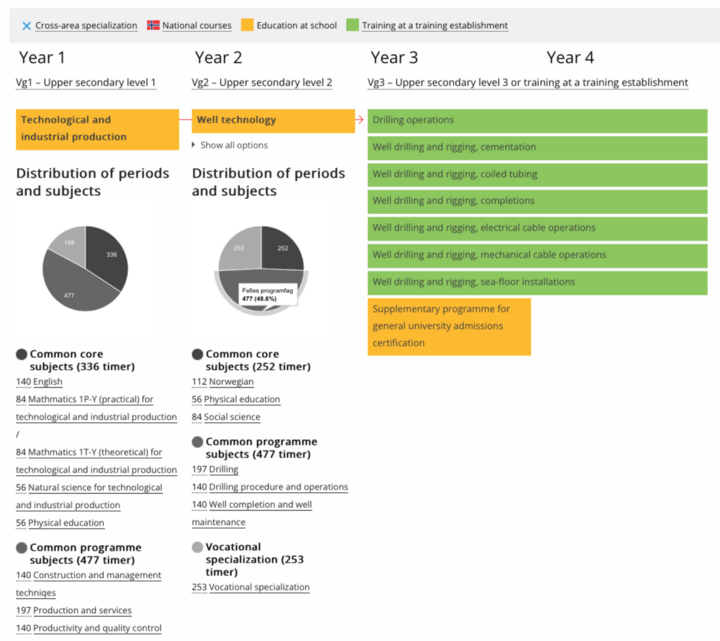 Working on a Norwegian drilling rig requires four years of study starting with high school; the last two years are an internship; passing a skills test to earn an industry certificate
Working on a Norwegian drilling rig requires four years of study starting with high school; the last two years are an internship; passing a skills test to earn an industry certificate
In Norway, the training of students is much more extensive. For example, Emmy Blix is not actually trained as an oil well worker because in Norway there is not that narrow training. Instead, she is pursuing a career as a drilling and maintenance operator with an industry certification. This includes high school options to study technology and industrial manufacturing . This is a fairly common high school experience. With this foundation, for example, you can go on to study maritime, watchmaking, firearms, shipbuilding, blacksmithing, automation, and many other specialties.
In her second year of high school, she chose oil well technology. This involves various subjects such as drilling, drilling procedures and operations, drilling completion and drilling repairs.
Senior year and senior year involve new choices. For example, you can study highly specialized things like subsea installation, rigging and cable operations.
How do these details relate to men or women? My point is that studying and working among blue-collar workers in Norway tends to be a broader and more interesting job than in the US. You’ll acquire a wider range of skills, perform more diverse tasks, and learn more interesting theories. Remember, oil production in Norway emphasizes the use of technology. Oil well workers in the US use a very manual and physically laborious process, probably simply because it is easier to train. Automated drilling in Norway is a more complex job requiring more training and theory. You have a hard time introducing modern technology into a system that doesn’t focus on skills.
It is not without reason that Germany is known as a manufacturing powerhouse. They have a similar system that emphasizes strong skills development and proper certification to demonstrate your skill strength. This means German automakers can build complex production lines knowing they have a well-trained workforce capable of performing a wide variety of complex tasks.
In fact, this disparity between the US and Germany creates huge problems for German automakers trying to set up factories in the US. American workers are too unskilled to work in a German-designed car factory. German automakers were forced to replicate German vocational high schools in the United States to produce the well-trained workers they needed.
Once you make a blue-collar job more of a skill and knowledge-based job than one based on raw muscle strength, you make it more interesting and attractive to women, while also raising social status. Are we surprised that American feminists haven’t pushed women into rough-and-tumble occupations with little career change and low status? Transforming these jobs into more diverse and skilled jobs will improve the status and earning potential of practitioners.
Norwegian parents are not afraid to put their daughters in such jobs in Norway, knowing that safety and worker welfare are paramount in the Norwegian system.
Can only a rich country like Norway automate oil wells?
Whenever I show something more human, more advanced, more reasonable in Norway, a phrase I often hear is: It’s just because Norway is so rich in oil. While rich countries obviously have more options, I don’t like this inference because people tend to take anything that exists locally for granted instead of accepting the vast amount of differences that exist in this world for political reasons and deliberate choices.
What if I said Norway and other Scandinavian countries were the first countries in the world to achieve 100% literacy? Is this because we are richer than other countries? No, Norway achieved full literacy about 150 years before Britain, which was significantly wealthier at the time. In fact, the Nordic countries were only mid-level countries in Western Europe at the time.
When I lived and traveled in the US 20 years ago, I remember being surprised how many things were done by hand and sometimes not very safe. America is a very rich country. It’s not just about having enough money, it’s about the work culture that exists in different countries.
I say this not to demean Americans, but to make American workers realize that they can and should demand better working conditions. Things have to be the way they are not a fact. When Norway started drilling for North Sea oil, it was all dominated by American companies. Norway has no oil companies and no expertise in the region. Americans have been drilling for oil since the 1850s.
There are many American workers in Norway, and the business is led by American bosses. In the beginning, Norwegian oil workers came from the rather barren parts of Norway, and they got along just fine with the Americans. For many, it was a huge adventure. It was an era of cultural exchange, and Americans taught Norwegians to eat Taco. So, until now, Taco has a special place in Norway: every Norwegian store has a Taco section, and many Norwegian households eat taco on Fridays.
However, it’s not all glossy. Industrial workers in Norway are shocked by how widespread illiteracy is among American workers. In Norway, illiteracy is a non-existent problem, associated with third world countries. The management style of American bosses also looks like the Wild West to Norwegians. Many were from Texas, and in today’s Norway, “Helt Texas” means completely crazy, barbaric. The accident rate was unusually high, and Americans were allowed to do things as they were used to at home. Things are not going according to normal Norwegian practice.
After many serious accidents, Norwegian authorities have had enough. By then, the Norwegianization of the North Sea oil industry had already begun. Norwegian experts are increasingly being trained. More companies have built up their expertise without American help. 1977 was a major turning point when the oil sector basically became Norwegian. Norwegian labor rules and practices were introduced, which was quite a shock to the U.S. leadership.
Norway is largely corporate democracy: A record of Norwegian corporate democracy .
Corporate democracy means that workers have a lot of influence over how businesses operate. They elect representatives with specific responsibilities. An employee selected as a representative is responsible for employee safety and welfare and can authorize production shutdowns. American leadership is confused: How does an employee have the right to shut down production?
Business leadership is required to work with employee representatives to continuously improve working conditions and safety. This was the beginning of a dramatic reduction in the number of accidents in the Norwegian North Sea.
I tell this story because I want to emphasize that when a country gets richer, health and safety doesn’t happen out of thin air. It’s about choice and dedication to a better work environment. It depends on the system you implement.
modern drilling industry
It is worth pointing out that automated drilling (making tubular connections) is very common these days. One common type is called Iron Roughnecks, which are widely used and make the operation safer. The Iron Roughneck is a human-operated robotic arm.
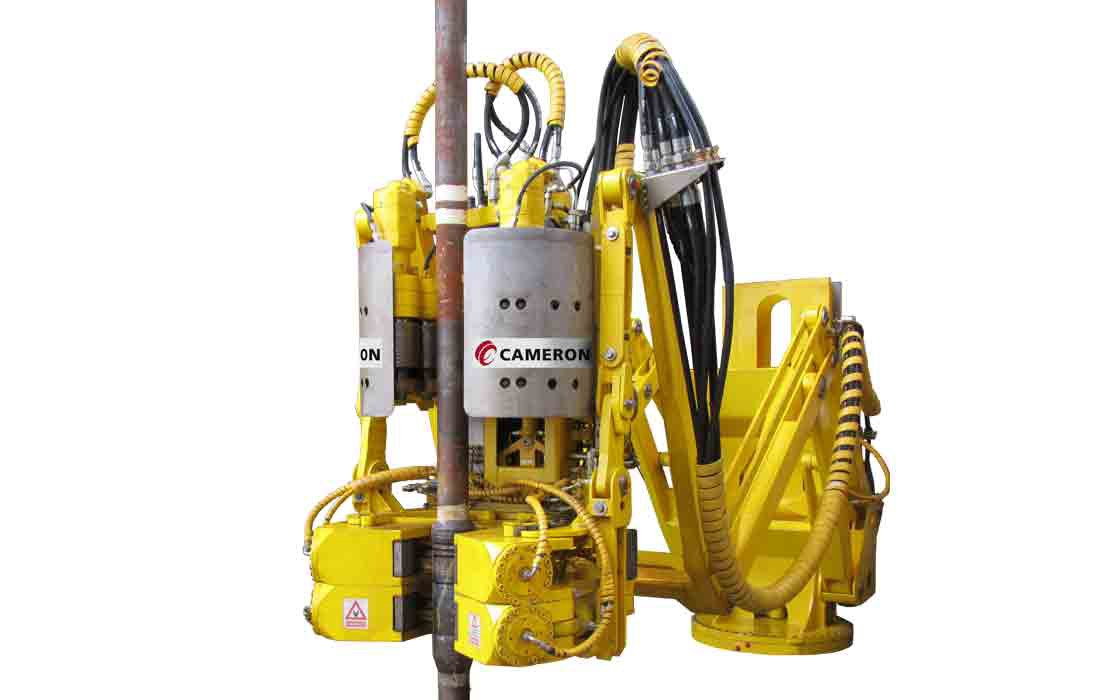 Steel drilling, connecting drill string with robotic arm
Steel drilling, connecting drill string with robotic arm
The Norwegian company Robotic Drilling Systems makes a more advanced fully automatic system.
→ Video: Robotic Drilling Systems
I thought it would be useful to quote one of the comments from this video to understand why automation is so important:
It’s a godsend to think how dangerous this job is. Before statistics were available, the average occupational lifespan of an oil rig worker was less than 10 years before being disabled or killed due to work-related injuries.
This is one of the ten deadliest jobs. I have two relatives who have been in this industry for 10 years and then became cripples because the work was so cruel.
—Phillip Mulligan
last words
I probably didn’t end up talking too much about feminism, but hopefully you’ll shed some light on where I stand on this issue. I lean towards a pragmatic approach. It shouldn’t be about competing with other genders for scoring. In general, what is good for male workers is also better for female workers. Creating safety isn’t just about buying expensive machines, it’s about procedures and giving employees a voice.
Quick Facts
- ?Science: Time: Do past, present and future coexist?
- ?Thinking : The Novelty Fallacy: Why New Is Not Always Better
- ?Game : What does Cyberpunk 2077 want to convey? We hear what the core members of the CDPR development team have to say
- ?️History : 45,500 years ago, this ancient cave painting tells us about early humans
- ?Society : Are digital media weakening citizenship?
donate
?Shyrism.News is a selected newsletter, bi-weekly, covering new anecdotes, hot topics, cutting-edge technology and other things about life and the future. With careful and meticulous screening, we fight against the algorithm that is strong outside and in the middle, and neutralize the indifferent and rigid code with enthusiastic words.
If you find “Shyrism.News” valuable, please support and share it with your friends or social networks.
Thank you friends for tipping, please be sure to note your salutation or email address to avoid losing data when you clean up your account.

This article is reprinted from: https://shyrz.me/news-22-gender-war/
This site is for inclusion only, and the copyright belongs to the original author.